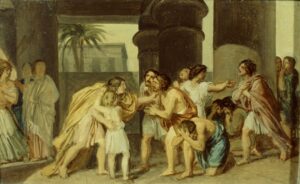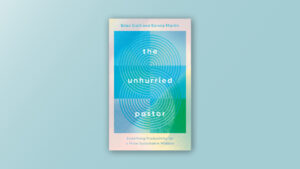In this sermon, Joel Beeke explores the significance of church membership. He discusses the biblical basis for belonging to and actively participating in a local church body, emphasizing the spiritual benefits and responsibilities that come with church membership.
The following unedited transcript is provided by Beluga AI.
It’s good to be here. I did chapel here once several years ago, but it’s been a while, so I appreciate the opportunity to be here again and being across the street from you. It’s wonderful that we can cooperate in so many ways. Doctor Lawler teaching our Hebrew, and Doctor Meter teaching our Greek. And Doctor Greer has taught four or five courses for us and helped us in a great number of ways for which we’re very grateful. So I feel that I’m among friends when I’m over here.
I’d like to read with you from Matthew, chapter 16. Matthew 16:13-20.
13 Now when Jesus came into the district of Caesarea Philippi, he asked his disciples, “Who do people say that the Son of Man is?” 14 And they said, “Some say John the Baptist, others say Elijah, and others Jeremiah or one of the prophets.” 15 He said to them, “But who do you say that I am?” 16 Simon Peter replied, “You are the Christ, the Son of the living God.” 17 And Jesus answered him, “Blessed are you, Simon Bar-Jonah! For flesh and blood has not revealed this to you, but my Father who is in heaven. 18 And I tell you, you are Peter, and on this rock I will build my church, and the gates of hell shall not prevail against it. 19 I will give you the keys of the kingdom of heaven, and whatever you bind on earth shall be bound in heaven, and whatever you loose on earth shall be loosed in heaven.” 20 Then he strictly charged the disciples to tell no one that he was the Christ. (Matthew 16:13-20, ESV)
So far, the reading of God’s word. Let’s pray together.
Pray God of heaven, we bow before thee as the beautiful and awesome and living God, the triune God, our loving father, redeeming son, sanctifying spirit altogether lovely and worthy to be praised and extolled, feared and adored. We thank thee, Lord, for thyself. We thank thee for thy word. We thank thee for Graham Rapids Baptist seminary and for its professors and students.
And we pray that each one of us may live lives of usefulness and fruitfulness for thy glory and for the kingdom of Christ. Help us, Lord, to surrender our entire lives to thee and to use every gift and the promotion of thy worthy son. We pray for thy blessing upon this chapel. We ask, Lord, that thou wilt be near to us, that thy word may grip us, mold us, shape us, form us, and make us better instruments to serve unto thy righteousness.
Forgive our sin, help us to be better men and women, to be more faithful, more holy, more humble, more believing, more loving, to be more like Christ. Conform us to the image of thy well beloved, our Emmanuel. We ask all this in Jesus Name, Amen. Well, how important is the life of the church in the individual Christian’s life? That question has been answered in various ways in church history.
At one end of the spectrum, I suppose, is the clericalism and the absolutism of Roman Catholicism, in which the visible and institutional church predominates, all so that, being administered by a hierarchy of priests and bishops and pope, it claims and wields total power, total power over the believer and matters pertaining to this life and to the next. Then at the other end of the spectrum is, I suppose, modern evangelicalism, in which Christianity is only personal faith and regards suspiciously the church as organized religion. Well, both extremes are rooted in unbiblical views of the church.
While breaking with the clericalism and absolutism of Rome, the reformers would also despise the excessive individualism of much of evangelicalism today. Calvin, for one, held a very high view of the church, didn’t he? Along with Augustine, he said, “If we do not prefer the church to all other objects of our interest, we are unworthy of being counted among her members.” Augustine had said, and Calvin agreed with this, “He cannot have God for his father, who refuses to have the church for his mother.”
But to that, Calvin added this remarkable statement: “For there is no other way to enter into life unless this mother conceive us in her womb, give us birth, nourish us at her breast, and lastly, unless she keeps us under her care and guidance until, putting off mortal flesh, we become like the angels.” In the past, Protestant believers have cherished the church. And today, that sense of appreciation is waning in general, so that many Protestants deprecate and depreciate the place the church occupies as Christ’s institution.
And I believe that this lowered view of the church is fostered by a lack of understanding about what the church truly is as Christ’s institution. And so, I want to set these famous words before you and look at three thoughts about them from Matthew 16:18 this morning. Simply the middle part of this verse: Upon this rock I will build my church. Upon this rock I will build my church.
18 And I tell you, you are Peter, and on this rock I will build my church, and the gates of hell shall not prevail against it. (Matthew 16:18, ESV)
My theme this morning is cherishing or appreciating the church. And I want to look with you at three thoughts. First, the status of the church, my church.
Second, the substance of the church upon this rock. And third, the success of the church I will build. When Jesus says, “I will build my church,” he’s declaring that the church belongs to him. He uses the word ekklesia, well known to you all, and used in several different ways in the New Testament. It’s used of the elect church, the worldwide church, the local church, a group of congregations, and at least on one occasion, it’s used of office bearers in a church.
But when Jesus says, here, my church, he’s claiming God’s people as his own. The ecclesia is his assembly, his people bound to him with ties far more intimate than ties of family or friendship. The ecclesia is defined here in terms of a saving relationship to Jesus the Messiah, who has done for her what the old sacrificial system merely foreshadowed in its attempt to atone for sin. So the ecclesia here is a people who are bonded to Christ in love and mercy, in forgiveness and dependence.
Now, Jesus, of course, starts with a very small group of ordinary people as he builds this ecclesiastical. But the amazing thing here is that he looks at this small, motley group of disciples and he says, you are my church, my church. You belong to me. You see, this is what we need to remember today. Whether we’re in a mega church, whether we’re in a church with a handful of people. Jesus says, this is my church. We must respect the church as belonging to him. This gives it its value, its identity, its status.
So if I said to you, I’m going to auction off this pen right now, how much will you give me? $0.50? Anybody give me a dollar? Oh, it’s Doctor Lawler’s pen. Maybe you’ll give me $5. But if I said to you, this is the pen. This is a stretch of the imagination, but this is the pen with which Calvin wrote his institutes, or Bunyan wrote Pilgrim’s Progress. You know, it might touch $100 because of the person who owns it. When we speak about the church, we’re speaking about the bride of Christ. He owns her.
She’s special. She’s very special. You have to be careful how we speak about the church. You have to appreciate her. Remember her bridegroom, remember her owner, remember her lord? I was 16 years old. My brother was 19, and he was engaged to really a wonderful, wonderful young woman who’s proved to be a very fine wife.
But we were riding along in the car, and as brothers are wont to do, we were talking about her a bit, and I made, well, I made a negative comment about her, which was not a good thing to do with an older brother. Well, I’ll never forget. He stepped on the brake, pulled over to the side, looked at me, poked me in the chest, and said, “Look, you can criticize me, you can do what you want with me, but don’t you criticize my woman.” I got the message.
But you see, why do we then so flippantly criticize the bride of Christ? Now, there is a place for criticism of the church, but it’s not a flippant criticism. It’s a criticism with tears. It’s a criticism of Jeremiah with tears running down our eyes. It’s a criticism with a heart for the church, not a flippant, callous depreciation of the church. This church belongs to Christ. She’s got a wonderful status. When you are called all your lifetime to serve in this church, God helping you, remember to whom she belongs.
Let this be your courage when you’re down and discouraged observing the bride of Christ. Now that’s all the more valuable when you consider what Jesus had to pay to bring this bride to himself. If this was Calvin’s pen, it would be valuable. But Calvin didn’t have to give his blood to write the institutes, but our Lord had to give his blood to purchase this church. His dowry price was his own blood. You know, Golgotha, today is a rather touristy place. Some of you have been there, I’m sure, as I have twice.
And the last time especially, it struck me how sanitized the whole place was. It was rather clean, rather touristy, but it wasn’t that way. It was a place of skulls and putrid flesh lying about. It was a place where the ugliness of sin was evident.
And our Lord was on that cross, forsaken of God, forsaken of men, was opposed by heaven and earth and hell, seemingly, and no one cast an eye to him. He was alone, he was outlawed, he was rejected, and that all to save you and me from that place of eternal torment.
How immense our depravity is, how immense sin is that God would send his son the taste of the lake of fire, so that on that crude, dingy, bloodstained cross, the center cross, our Lord of glory would bear all the hurls and insults of soldiers and spectators and priests and the elders in their holy robes of office. Oh, what a tragedy. An outcast from his father’s house.
There he hangs in the naked flame of God’s holiness, bearing our sin, wounded for our transgressions, filling up, as Thomas Watson said, the red glass of Christ’s sufferings so that you and I could be part of this bride, part of this church. If you love the Lord Jesus Christ, my friend, when you criticize the church, you’re criticizing yourself because you’re part of it. Like Spurgeon said to some lady who couldn’t settle on a church home, he said, well, what kind of a church are you looking for? She said, I’m looking for a perfect church.
He said, don’t join it. It won’t be perfect anymore. You say we’re all part of the problem of the church’s imperfections and the church’s warts and wrinkles. You see, the church people are not the ideal of the church. Christ is. And so we value the church because it belongs to him. And he will present her one day without spot, without wrinkle before the countenance of the father. Now, Jesus says of this church that he will build it upon this rock. He speaks here of the church’s substance, this rock.
Now, you know that wars have been fought over these words. People have shed blood and spilled ink over them. Church leaders and synods have argued about them. These words are inscribed in letters of gold on the great dome of St. Peter’s in Rome. In fact, Rome says that the rock is Peter, who served as Christ’s vicar on earth. And so, Peter, in turn, is claimed as the founder of the Church of Rome. His role as vicar of Christ is past the succeeding bishops Rome claims.
Well, most Protestants acknowledge that these words refer in some sense to Peter, whose name derives from the word for stone. But the rock Christ speaks of doesn’t refer to Peter’s person, but to his confession. Ultimately, the rock cannot be Peter, an erring, unstable man, but the mighty truth that the Father revealed to Peter, namely the messiahship, the divine sonship of the Lord Jesus Christ. He is the rock.
And you see, this does justice to the classical distinction Jesus maintained between Petros Stone and Petra Rock, which may indicate, as JW Alexanders pointed out, that while Peter was a stone, that is, a fragment of the rock, his master was the rock itself. Christ alone is the chief cornerstone. But he builds his church from the stones. He sets up upon the rock. He’s the rock, he’s the mediator, the minister, the surety of his church. He builds this church with a substance that we call sinners, people like you and me.
By the way, Peter was a sinner as well. So Jesus changes sinners by his power. He makes them confessors of his name. He works commitment in their lives, and he builds them upon himself, upon his rock. And he makes that church one in him. All who love the Lord Jesus Christ in sincerity belong to this church. And yet, we know that the unity of that church can be easily disrupted.
And when it is, we, we should feel shame and grief at how divided the church can become because of her unfaithfulness to Christ and her declension from the apostolic pattern of unity. So in the New Testament, we find as such sins as inattention to doctrinal purity or autonomy or factionalism or lust for power or unwillingness to seek reconciliation or failure to maintain discipline or unwillingness to help needy believers. All these things tear apart the body of Christ, and they produce church and denominational splits.
So we need to recognize the value of the church, the substance of the church. And then we must understand that we cannot touch any, any part of the church’s body without affecting the whole body. As Paul says in 1 Corinthians 12, disunity affects the whole church, including its work of evangelism. In John 17, Jesus prayed for the unity of the church so the world would believe that God sent His Son to be Savior of the world.
Oh, how it ought not to grieve us that that is evidently not the case in our broken world, and that can discourage us when we see the church’s decline from within and society’s threats from without. You and I are tempted to say the church cannot survive. It might even be tempted to say, let’s abandon her. Church is not worth it. Well, you don’t abandon your mother, do you? Calvin said, the church is our mother. You don’t abandon her. And you remember, you see that because she is the church, she’s Christ’s bride. She cannot fail.
Our Heidelberg catechism says it so beautifully: By faith, we trust that the Son of God, from the beginning to the end of the world, gathers, defends, and preserves by His Spirit and word, out of the whole human race, a church chosen to everlasting life, agreeing in true faith, and that I am and forever shall remain a living member thereof. How can the church’s future be so secure? All because of Jesus’ promise, “I will build my church upon this rock.”
So you have here not just the status and the substance, but also the success of the church promised. And that success is another reason why we should appreciate and cherish the church. The church is the one institution that has survived for 2000 years. No world empire has done it. This motley group of disciples. What a miracle. Friends, this motley group of disciples has blossomed into a church of millions. Jesus’ promise is proving true. Still today, he doesn’t say, “Here I’m going to try to build my church.” He says, “I will build it. I will build it.”
I, the creator of the heavens and the earth, have called the world from nothing. By my power, the almighty God, will build my church, and the gates of hell or Hades will not prevail against it.
18 And I also say to you that you are Peter, and on this rock I will build My church, and the gates of Hades shall not prevail against it. (Matthew 16:18, NKJV)
The gates of Hades lead to more than death. They lead to all the powers of darkness and evil. Jesus sees Hades, as it were, as an organized city with gates. You know, a city gate in the ancient world was a place where judgment and wisdom were dispensed by the elders and rulers of the city.
Just recently, a few months ago, I got to see that in the archaeological remains of Dan, just outside the city gates. And it shows. Even you can still see where some of the elders sat today. It’s quite impressive. But Jesus says what Paul describes in Ephesians 6 as the powers of darkness organized to destroy the people in the kingdom of God. This is what the gates of Hades are all about. And this church will not founder before the gates of these powerful enemies.
Yes, the church may lose many skirmishes, but it will win the great battle because Christ is stronger than Satan; therefore, his church will defeat Satan’s army. The seed of the woman shall prevail over the seed of the serpent upon this rock. It’s a preposterous statement to a handful of insignificant people, fishermen, a tax collector or two, and other disciples. Upon this rock I will build my church, and the gates of hell shall not prevail against it.
18 And I tell you, you are Peter, and on this rock I will build my church, and the gates of hell shall not prevail against it. (Matthew 16:18, ESV)
But what seems so preposterous is still happening today and throughout all history.
Though there were times the church seems overwhelmed by the powers of darkness, she survived. God, in the midst of her, doth dwell. John Fabel admonished his people: be not too quick to bury the church before she is dead. You can be discouraged in the church; you think things are going the wrong way, you think you have bad meetings in the church, disharmony. Things are going to fall apart. Oh, remember this promise: the church may stagger, but she will continue her march through history to ultimate triumph. Individual churches may sometimes close their doors.
Denominations may wither, but the church of Christ will grow and prosper. The Belgian Confession of Faith puts it this way: This holy church is preserved or supported by God against the rage of the whole world, even though she sometimes for a while appears very small and in the eyes of men, to be reduced to nothing. As during the perilous reign of Ahab, the Lord reserved unto him 7000 men who had not bowed their knees to Baal. And of course, Elijah thought he was the only one left.
And so our evangelism and all our efforts to build up the church are not desperate activities. They are urgent activities. People are dying. People are going to hell. Our God is in control. You see, if we grasp God’s perspective of the church, many of the problems we have in the little local churches would seem so small. While Israel saw only rubbish, the rubbish of Jerusalem, God saw rebuilt walls. And we see a church torn by dissension. God sees a glorious church elected by the father, redeemed by the Son, adopted by the Spirit.
Glorious things of thee are spoken. John Newton wrote, Zion, city of our God. He whose word cannot be broken formed thee for his own abode. On the rock of ages founded, what can shake thy sure repose? With salvation’s walls surrounded, thou may smile at all thy foes.
You see, what we need to remember is the church’s future is secure. But now, she is a work under construction. A building site is not a very pretty place. I understand you’re going to have an expansion on this building.
It’s going to be rather homely for a while, as our building was across the street. And the building sites are places where brick, straw, strings, and paraphernalia are lying about. It’s not a very beautiful place.
You see, the church is a fleet of fishing boats, not a yachting club. As someone said, a hospital for sinners, not a museum for saints. And when we train for the ministry, we dedicate our lives to a work in progress, to what Christ has promised and paid for with his own blood.
We dedicate our lives to what is worthwhile and shall be successful in the end. Though there is dross amidst the gold, so our work is never in vain. That’s one wonderful thing about being a minister. You never have to wake up, not even in midlife crisis, and say, I have nothing worthwhile to do. you’re doing the work of the Lord. you’re building.
You’re working on a building site that is in process, an untidy one, perhaps an unimpressive one in the eyes of men, perhaps many loose boards and bricks and ugly trenches and waste and rubble and abandoned tools. But don’t look at the mess. If you only look at the mess, you become discouraged. If I think of my church right now, I can think of all these unfinished people full of imperfections, full of weaknesses. I know their faults. I know their problems. I know their agonies. I know their joys. I know their sorrows.
I’m sure there’s a lot. I don’t know if I focus on that, I’m just going to get overwhelmed. But instead of criticizing people who fall short of our expectations in the ministry, we had rather get on our boots, our overalls and our helmets and get busy on the work site. Church work is hard work. Building buildings is hard work. My dad was a carpenter. I worked for him in some summers as a teenager. I know it’s tough work, but church work is tougher. Spiritual buildings are tougher.
And yet our master says, “Ora et labora,” pray and work. And that must become our work song. As Kelvin said, JC Ryo put it this way, “The Church of Christ needs servants of all kinds, instruments of every sort, penknives as well as swords, axes as well as hammers, Marthas as well as Marys, Peters as well as Johns.” And so, though we’ll struggle with many challenges and you will experience many, many discomforts along the way, press on, remembering what the church is going to be: a bride adorned for her husband, without spot or wrinkle.
The future, the success of the church is guaranteed. Our savior said so. He’s been fulfilling it for 2000 years, and one day he’ll present the church as a bride to his father without spot, without wrinkle. Perfect souls, perfect bodies to serve a perfect savior for a perfect eternity forever. Matthew Henry said, the church will survive the world and be in bliss. When the world is in ruins, when men are projecting the church’s ruin, God is preparing for her salvation. Actually, the whole world will be redeemed; there will be new heavens and a new earth.
So the next time you become discouraged by the church, would you try to ask God along with me to remember that before we complain about the messiness of the building site, to reflect on the fact that every one of us also is under construction and we also aren’t tidy. you’ve got bosom sins, darling. Sins, the old divines called them, that you struggle with. I do. We’ve all got a ways to go, don’t we? None of us have arrived. Some of us aren’t very impressive yet.
Our faith, which may be true faith, is not yet as strong as it ought to be. But let’s remember that little strings as well as big strings are needed in God’s concert of grace and the work of the church. Though it may be small in our eyes, it’s Christ’s work. It will abide. He’ll perfect you. He’ll perfect his church. All if we could only see ourselves, see our own sinfulness, see how easily we stumble into sin, we’ll be less critical of the church. We’ll be less critical of our brothers and sisters in Christ.
We’ll be more loving, more humble, and we’ll remember the work will one day be done because He said it, “I will build.” I believe in a holy, universal, apostolic, eternal church, built and maintained by Jesus Christ. On the solid rock of Peter’s confession, “Thou art the Christ, the Son of the living God.”
16 Simon Peter replied, “You are the Christ, the Son of the living God.” (Matthew 16:16, ESV)
I believe in the perseverance of the saints because I believe in the perseverance of the Christ of God. “The church is nothing,” said Richard Sibbes, a Puritan.
But Christ displayed, and he will not forsake the work of his own hands, for he is the king of his church, and the church is the greatest queen in all the world. Do you love the church because God loves her? Do you cherish the church? Appreciate her? Are you willing to lay down your life for her?
Let me close this chapel with just one illustration I came across recently of a young man in the 19th century who was blind. His name was William. He was the son of an admiral.
And a young gal fell in love with this young blind man. And the admiral had a friend who was a surgeon. And the surgeon said, said to the admiral, I think I have a solution for your son, a possible surgery that may help him regain his sight. And he approached the young boy, and he said, the young man, and he said, I’m willing to undergo the surgery, but I want to do it just before I get married.
And if it works, I want the very first thing that I see to be my bride coming down the aisle. And that’s what happened. Went through with the surgery. His head was all bandaged up. Wedding day came. Bride was standing at the end of the aisle. And when the music began to play for the bride to come down, his father came forward, unwrapped the bandages from around his head. The first thing he saw, and it worked, was his bride. And he cried out, you are.
Aloud, he said, you are far more beautiful than I ever imagined. I think one day when all the scales will fall from our eyes, we will enter into glory. Christ will look at us and be satisfied. We will look at him and be satisfied. And we will look at each other and be satisfied, and will see the building fully done and all its beauty, splendor, glory, and majesty, serving the Lord Christ without spot and without wrinkle. I think we will turn to our savior.
Savior, and say, not only you but also your bride is more beautiful than we ever imagined. Let’s pray. Great God of heaven, how great is thy church? Because thou art the great promiser and keeper of it. The great surety, mediator, minister, testator of it. Oh, we thank thee, Lord, that we may serve thy church. That the church is not ours but thine. And we pray, Lord, that its status, its substance, its success may give us courage to go forward, that we may lean hard on thy promise. Upon this rock I will build my church.
Bless each man here, each woman, each future minister, each faculty member. Help us all, Lord, to labor for the well being of the bride of Christ and to hanker after that day when this mortality shall put an immortality, this corruption in corruption, and we shall ever be with the Lord in a perfect church in glory forever. We pray in Jesus Name, Amen. Thank you very much.
Involved in Women’s Ministry? Add This to Your Discipleship Tool Kit.
 We need one another. Yet we don’t always know how to develop deep relationships to help us grow in the Christian life. Younger believers benefit from the guidance and wisdom of more mature saints as their faith deepens. But too often, potential mentors lack clarity and training on how to engage in discipling those they can influence.
We need one another. Yet we don’t always know how to develop deep relationships to help us grow in the Christian life. Younger believers benefit from the guidance and wisdom of more mature saints as their faith deepens. But too often, potential mentors lack clarity and training on how to engage in discipling those they can influence.
Whether you’re longing to find a spiritual mentor or hoping to serve as a guide for someone else, we have a FREE resource to encourage and equip you. In Growing Together: Taking Mentoring Beyond Small Talk and Prayer Requests, Melissa Kruger, TGC’s vice president of discipleship programming, offers encouraging lessons to guide conversations that promote spiritual growth in both the mentee and mentor.





















